Our story of Cotton Mather and Joseph Dudley begins in 1686. Cotton Mather has just assumed leadership of the Second Church of Boston, lifting the burden from his father, Increase, just named president of Harvard College.
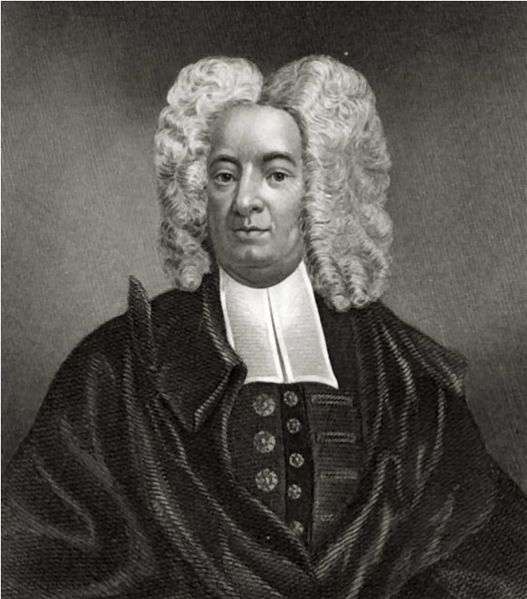
Cotton Mather
Increase Mather was one of the most powerful Puritan ministers of his day. Cotton wanted to make a name for himself and rise to the level of influence of his famous father. He also had prominent grandfathers, Richard Mather and John Cotton.
King James II had thrown the colony into turmoil that year. He had revoked its charter, which had allowed the colony to choose its own leaders and largely govern itself. James replaced the government with his hand-picked appointee, Edmund Andros. Andros had a second in command, Joseph Dudley. Dudley governed on an interim basis in 1685 while Andros awaited finalization of his appointment.
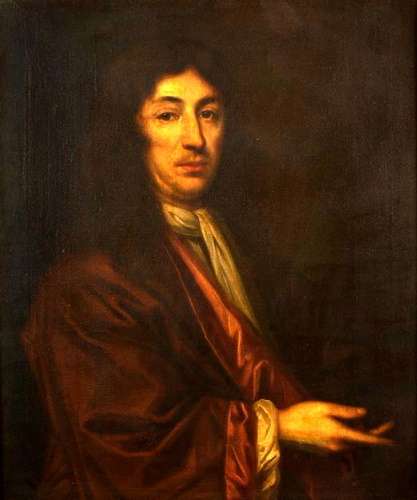
Portrait believed to portray Joseph Dudley
Andros issued offensive new rules. He banned town meetings, levied new taxes and tried to give away public lands. Dudley enforced his decisions as judge.
Joseph Dudley
Dudley was the son of Thomas Dudley, a devout Puritan who arrived in the new world in 1630 and served four terms as governor of the Massachusetts Bay Colony. Dudley, like his father, embraced Puritan beliefs.
Andros did not like the Puritans . Not only did he curtail the functions of local government, but he also began extending protections to people of other churches.

Sir Edmond Andros, bigoted papist
Dudley believed in the legitimacy of royal power. Even if he disagreed with Andros, as an agent of the king he would not have challenged his authority.
As Andros tried to establish his power, the colonists began to rebel. The Rev. John Wise of Ipswich led a group of men who declared increased taxes could not be collected without town meeting. The men were arrested and hauled before Dudley, determined to show the colonists once and for all that they no longer had the power to set policy on tax issues. When Wise objected, the high-handed Dudley replied: “Mr. Wise, you have no more privileges left you than not to be sold as slaves.”
The remark would haunt Dudley.
Witch Trials and Strange Bedfellows
Against this backdrop, in 1688, Cotton Mather was called upon to pray for the health of the children of one of his parishioners, John Goodwin. Goodwin employed a cleaning woman, Ann “Goody” Glover. Originally from Ireland, she had come to the United States via Barbados. She and her family belonged to the thousands of Irish that the English government forcibly deported to the West Indies as indentured servants in the 1640s.
By 1688, she was an elderly cleaning woman, widowed and living in Boston. She had an altercation with one of the Goodwin children over some missing cloth. Shortly thereafter the children began feeling ill.
A doctor came to see the children, and he diagnosed them as suffering from witchcraft. Cotton Mather and Joseph Dudley served as accuser and judge, respectively. The two oversaw Glover’s conviction. She was hanged for witchcraft, but her real sin was her Catholicism. Had she renounced her Catholicism, they likely would have spared her.
The case foreshadowed the 1692 witch hysteria in Salem, in which the Mathers played a role. Cotton Mather famously, in the Salem case, wrote that spectral evidence could be used, but should not be the sole reason for convicting someone.
The Overthrow of Andros
The alliance between Cotton Mather and Joseph Dudley didn’t last long. In 1689, news of the overthrow of King James II reached Boston. Angry colonists then arrested Andros, Dudley and other appointees of the King. The colonists shipped them off to London to answer charges of 119 illegal acts. Those included attempted theft of public lands, stolen customs payments and arbitrary exercise of power..
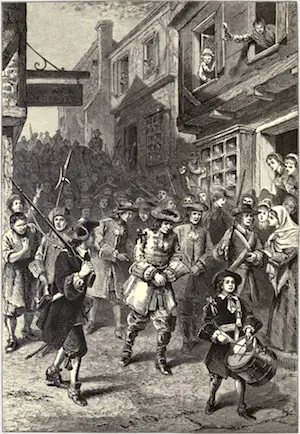
Andros is taken prisoner during the Boston Riot, er, Revolt.
Andros was replaced with the previously elected government. The Puritans then began lobbying for a permanent return of democratic government.
Dudley denied the charges levied against him by Cotton Mather and blamed Andros. Though seven colonists had leveled charges, they had no agent in London to prosecute. And so Dudley went free, a loose cannon.
Soon Dudley was back in America, this time serving as judge in New York. Here, support for James II was stronger and democracy not well established. Colonists, led by Jacob Leisler, revolted against the colonial governor, but they didn’t have unanimous support.
When the new king, William, sent his instructions to the colony, Leisler was arrested. Dudley won a judgeship in New York and presided over the trial that sentenced Leisler to death. Mather then charged Dudley with being bloodthirsty and high handed in advocating the death penalty, though Dudley disputed that.
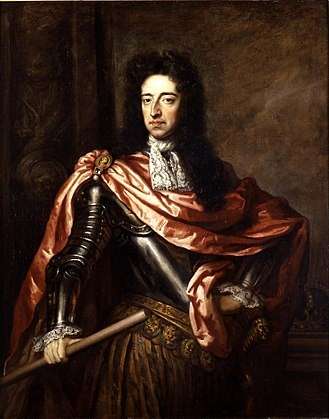
William of Orange
In 1693, Dudley – universally unpopular – returned to England. He began building a case for his appointment as governor of all of New England. The idea that Cotton Mather would become his most important ally in regaining power might seem preposterous, but that is exactly what happened.
Dudley’s Return to Power
Increase Mather had served as Massachusetts’ envoy to England in 1690i. He had tried to lobby the new king to restore the original colonial charter that allowed Massachusetts citizens to elect their own governments. He lost support back home when he acquiesced to a replacement charter that reserved more rights for the king.
Increase lobbied his friends to return him to London, but he was blocked. Dudley, meanwhile, living in England and acting as deputy-governor for the Isle of Wight, pulled every string he could to win his way back to New England.

William Phips
He succeeded in having the Mathers’ hand-picked governor, William Phips, arrested and brought to England to face dubious corruption charges. Phips died before he could clear his name. But still Dudley’s reputation was so blackened that he could not win the king’s appointment to govern New England. Richard Coote, 1st Earl of Bellomont won the appointment in 1695.
Dudley chanced on an idea, however. Hearing of Increase Mather’s difficulties in returning to London, he reached out to Cotton Mather with a promise to advocate for his father’s return. The Mathers both desperately wanted this and thought Dudley was now an ally and controllable. Cotton Mather wrote a letter in support of Dudley’s return to Massachusetts as governor.
With Lord Belomont’s death in 1701, and the Mathers now in his pocket, Dudley sought and received the appointment he coveted – a return to New England as its governor.
Cotton Mather and Joseph Dudley Feud Again
It would not take long before Cotton Mather recognized his mistake. Almost immediately Dudley double-crossed the Puritan minister. Mather had advised Dudley who he should take advice from and who he should not trust. Dudley immediately passed on Mather’s opinions to his enemies, infuriating all involved.
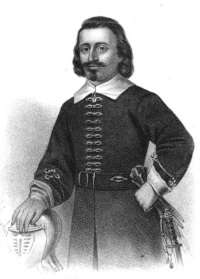
John Leverett
Mather also sought appointment as president of Harvard to replace his father. But Dudley declined to give it to him and chose John Leverett instead.
The high-handed treatment of Mather was completely in character for Dudley. But whatever joy he found in the double cross was certainly tempered by the storm of controversy he brought down upon himself.
Both Mathers now took up their pens and pulpits and began railing against Dudley. He was a murderer (in the case of Leisler), they charged. A thief of public funds. He illegally traded with France, they alleged. He smuggled and usurped fishing rights from the colonists. The list of grievances was enormous.
Many of the charges against him were flat out fabrications and exaggerations, but Dudley spent considerable time in rebutting them. He ended up traveling to England for a hearing with the Board of Trade.
Dudley Undone
Dudley would retain his post until 1715. Finally, however, Dudley was undone. A group of businessmen wanted to print money to back a bank proposal, and Dudley thwarted them. Instead he argued the colony should fund the proposal by borrowing and thus protecting the value of currency already in circulation.
This decision added too many people to the list of enemies who hated Dudley and, with much lobbying, he was replaced as governor. The animosity between Dudley and the people would set the tone for relations with the government in New England for the next 50 years, long after Dudley died in 1720 at his Roxbury home.
Images: Joseph Dudley By Attributed to Peter Lely – http://www.eldreds.com/sales/detail.php?itemID=97915, Public Domain, https://commons.wikimedia.org/w/index.php?curid=14855236. This story was updated in 2023.
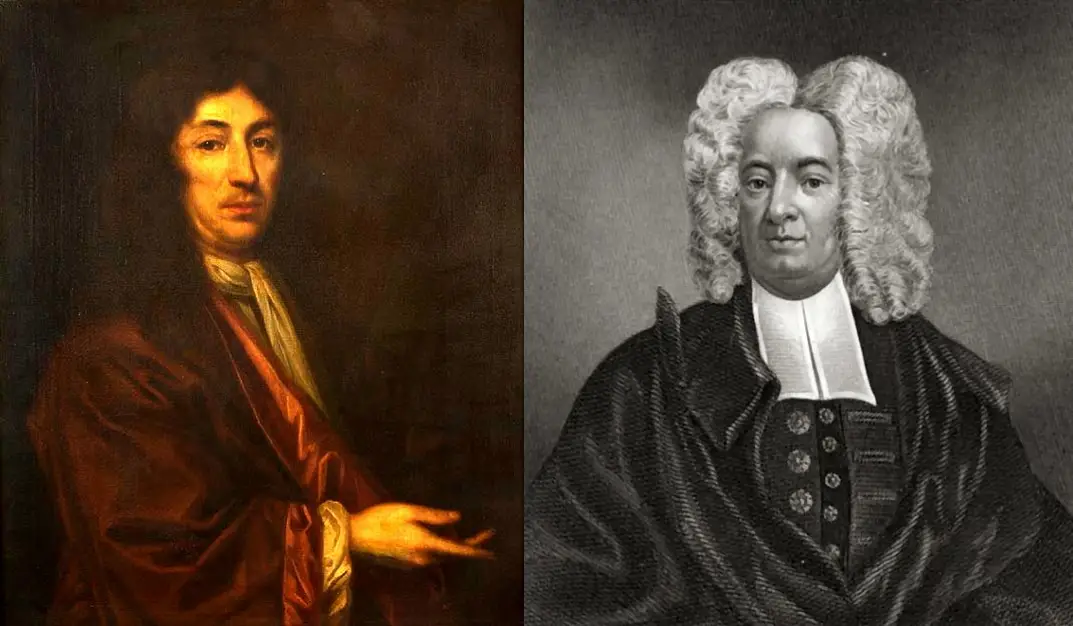

30 comments
[…] February, that the Puritans in Boston held no church services for two successive weeks, reported Cotton Mather. The events were so unusual that he and other contemporary diarists made note of how exceptionally […]
[…] Cotton Mather wrote in his diary: […]
[…] February, that the Puritans in Boston held no church services for two successive weeks, reported Cotton Mather. The events were so unusual that he and other contemporary diarists made note of how exceptionally […]
[…] you will not hear the warnings of your faithful pastors,” preached Mather, “hear the roarings of twenty-six terrible preachers that, in a ghastly apparition are now from […]
[…] Great Shippe would later reappear in legend. The Rev. James Pierpont, in writing of the ship to Cotton Mather, reported that the citizens of New Haven were agitated when no word of the vessel reached them for […]
[…] father to Increase Mather and grandfather to Cotton Mather, had been suspended by the Church of England for failing to […]
[…] John George, a prominent Boston merchant, petitioned the Massachusetts General Court on Jan. 3, 1713, to build a lighthouse 'for the Direction of Ships & Vessels in the Night Time bound into the said Harbour.’ George died on Nov. 24, 1714, before construction of the lighthouse even began. His widow buried him in another man’s tomb and later married Cotton Mather. […]
[…] prolific Cotton Mather highlighted the rock in a sermon in 1689, which he later published as The wonderful works of God […]
[…] battles or clipper ship races. New Englanders have been drawn to the supernatural since Cotton Mather blamed earthquakes on the devil. New England. Ghosts, witches, devils and monsters in human shape […]
[…] alumni include Samuel Adams, Leonard Bernstein, Cotton Mather, George Santayana, Ed Ames, Phillips Brooks, Bernard Berenson, Richard A. Clarke, Ralph Waldo […]
[…] in three volumes, Winthrop’s family was generous in lending the journals to historians. Cotton Mather borrowed them for Magnalia Christi Americana, published in 1704. Ipswich Minister William Hubbard […]
[…] casting Anne Hutchinson out of the Massachusetts Bay Colony, branded as a heretic. And his nephew Cotton Mather famously celebrated the Salem Witch Trials. Still, those sins seemed pardonable in their day, […]
[…] Historian and author Rev. Cotton Mather wrote in his histories of America that the exact details of the Hartford Controversy were hard to tease out even at the time they were ongoing. Personal animus had overwhelmed the substance of the debate, but essentially it boiled down to whether the church should offer baptism to non-church members. […]
[…] minister Increase Mather wrote 'about this time [1631] the Indians began to be quarrelsome touching the Bounds of the Land […]
[…] Cotton Mather, notorious for supporting the Salem witch trials, devoted a chapter of his 1702 book, Magnalia Christi Americana to Smith’s last days and […]
[…] subsided, the Puritans of Massachusetts Bay Colony tried to justify killing 20 people. The Rev. Cotton Mather explained the devil used witchcraft to persecute the Puritan settlers. Five years after the […]
[…] Boston, Rev. Cotton Mather reported there had never, in the memory of man, been a night like the one that followed the 29th of […]
[…] Cotton Mather tried his hand at writing a medical book. And one popular medical book from the 1600s that made its way to America with the earliest colonists was The Queens Closet Opened, or The Pearl of Practise: Accurate, Physical, and Chirurgical Receipts. It purported to be a compilation of cures originally created for the British royal family. Here are some of its secrets: […]
[…] Cotton Mather called him a rare scholar. Of his students, Mather said, ‘their Education truly was In the School of Tyrannus." […]
[…] Increase Mather, born in 1639, was so named in the midst of the Great Migration of Puritans. “Increase” meant "…the never-to-be-forgotten increase, of every sort, wherewith God favored the country about the time of his nativity." […]
[…] July 27, 1660, they arrived in Boston, where they knew Increase Mather and Daniel Gookin. Gov. John Endecott received them warmly. They thought themselves safe and lived […]
[…] In Deerfield, John Williams was a prominent Puritan minister, married to Eunice Mather, the daughter of Eleazer Mather and first cousin to Cotton Mather. […]
[…] Increase Mather, an ambitious 36-year-old minister, had a fanatical desire to reform Puritan society. He believed the Puritans had strayed from the founding generation’s moral purpose. He was literally a product of those founders: His father, the influential Rev. Richard Mather, had come to Massachusetts Bay Colony during the Great Puritan Migration. […]
[…] Mather, the Puritan minister, wore a long, brown, curled periwig that emphasized his large nose. Sewall, the judge and printer, wore a black skullcap to hide his bald pate. Mather defended the periwig in a sermon, while Sewall denounced it whenever he got the chance. […]
[…] Cotton Mather, on the other hand, wrote a paper on the High Tide Storm for the Royal Society of London. In it, he called the damage to Boston ‘inexpressible.’ […]
[…] Mass.; and Londonderry, Vt. They were once the frontiers of New England. The Puritans, led by Cotton Mather, encouraged the Scots-Irish to settle in places where they would serve as buffers against the […]
[…] to the strange rock will be in good company as Cotton Mather, George Washington and dozens of scientists have attempted to decode the meaning behind the […]
[…] When Benjamin Franklin first returned to Boston in 1724 after a year in Philadelphia, he went to visit Cotton Mather. […]
[…] In 1715, the younger Elizabeth Goose was married to a Boston printer named Thomas Fleet – by none other than Cotton Mather. […]
[…] had attracted the usual crowd at her bedside. The room grew overheated. Margaret fainted, and Mather fanned her with his hat. Margaret had begun to sense information via her spiritual connections. She […]
Comments are closed.